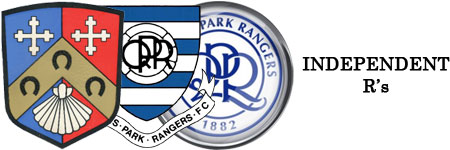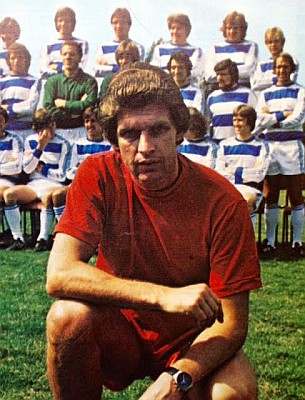Issue No. 9 of the Supporters Club magazine: ‘The Superhoop’, included an in-depth interview with Frank Sibley at the ‘Rangers Stadium’ on Tuesday 13th September 1977:
KF: Frank, were you surprised when you were offered the Manager’s job?
FS: Yes, my first reaction was surprise. I’d always hoped that at some stage I might get the chance of the Manager’s job here. Especially having been here for so long, coming through as Youth Team Manager, Reserve Team Manager, Assistant Manager, and knowing the players, but while Dave was still Manager it seemed quite a long way off.
KF: What was it like working under Dave Sexton? Did you feel held down?
FS: Well, not really, it was just that Dave was his own man. He preferred to do his own coaching and the only opportunity that I had to coach the first team was if he was away on football business or could not get in.
It was a little bit frustrating but it was one of those things. I was still learning, I was still only 29 and I was picking up ideas on the coaching and managerial sides, which would stand me in good stead for the future.
KF: Since becoming Manager have you had to change as a person?
FS: Yes, I suppose you have to. But I don’t think you have to change that drastically, I cannot see why one should not be friendly with players as well as their Manager. I think if you are fair and honest with players and they are with you then that is the best relationship.
KF: What changes have you made at the club since taking over as Manager?
FS: Well, on the coaching side, John Collins has joined me with the first team, Mick Keen has become second team Manager. Derek Healy has come in as Assistant Manager, which I feel is a very important appointment. He is going to completely re-organise the scouting structure of the club, together with Chris Gieler, who looks after the Youth side of it. And also he will be taking on some of the business that I have been dealing with.
KF: Do you feel you have had any influence on the team yet?
FS: It’s a bit early to say. I’ve tried not to alter the style too much, which I don’t think I could do anyway, with the type of players that are in the club. They like to play entertaining football and I like to see it. But at the end of the day it is the results that count and I think the entertaining football will come with the results.
KF: What does your average day consist of?
FS: I would be in at the training ground at about a quarter to nine. The staff would be there, Richard Roberts and the coaches. We would have a chat about the training schedules for the morning, the different groups and what we covered. Then I would discuss the progress of the injuries with Richard and go along and see them. We would start training at 10.30, for about two hours. Shower, change, then come back here and sort out any business.
I might have players to see, press, phone calls to make to other managers, organising travel arrangements, scouting reports. Then, perhaps watch a Combination match in the afternoon and go on to another match in the evening. I would arrive home at about 11 o’clock at night.
KF: So you try and see as many games as possible?
FS: Yes, I think it is important that I should see as many games as possible and as many players as possible. Different standards as well, so that you have got a good general view of what you require. Then, if and when a player becomes available, you know in your mind who he is, where he plays and in what position.
KF: It must have been a blow to you to have to give up playing because of your knee injury. Did you decide to go into coaching then or had you contemplated moving out of football?
FS: Yes, well, first of all it was a blow, without any doubt at all, to suddenly find your career is going to end, especially at the age I was because you think then that you are going to play forever. Consequently at that stage I had never taken any coaching courses or badges.
I had my testimonial and I was working hard on that and during that time, through the Chairman, Gordon Jago offered me the Youth Team Manager’s job. I enjoyed that and then I gradually graduated through the youth team to the reserves and then Assistant Manager and now Manager.
KF: And meanwhile you took coaching courses?
FS: Yes, in the meantime I went away and took the preliminary badge, which is the first stage. I passed that and then next year I went back up to Lilleshall for a three-week course and took my full coaching badge, which I also passed.
KF: How about influences Frank, has anyone influenced you on the managerial side?
FS: I think that there are a lot of people under whom I have been fortunate to work with here. Undoubtedly the biggest influence must have been Alec Stock because I spent most of my playing career with him. He has very high principles about football and management, so he was a big influence.
I learnt a lot from Gordon Jago, Bobby Campbell and Jimmy Andrews when they were here. Bill Dodgin even Tommy Doc and of course Dave Sexton. Under all of them, I learnt something, some good things and some not so good things. I think that if you sift out the things that are going to be useful for you then I must have gained a lot of experience really.
KF: Do you think that football coaching has changed much from the time that you were playing till now?
FS: I think it has. I don’t think that football in general changes too much. We like to think it changes but it goes through phases really. There is a lot more thought going into it today compared with when I first started. Then it was mostly running and fitness but now there is a lot more emphasis on technique and tactics. It is more professional.
I think there is a lot more pressure put on the players today to get results, and managers and coaches. Sometimes you are not given quite as much time as you need to re-organise a club and to get the club on a sound footing.
KF: How do you think that the game is going to develop in the future?
FS: Well, I think that it has got to develop in the area of sponsorship, and with it will come the freedom for players to transfer between this country and abroad. I think that has got to come and I think that can only be for the good really, having continental players over here, continental coaches and continental managers.
Managers and coaches are going to work harder because if they don’t they are going to be out of a job. And they are going to work harder in respect that if they are good at their job they are going to reap the rewards the same as the players.
I also think it is important now that we start bringing our own youth through. Producing our own players and bring them up the way we want and also avoid paying extortionate transfer fees. I think that has got to be corrected and that is why I brought Derek Healy and Chris Gieler together to rectify this.
KF: What made you appoint two ex-Rangers players as coaches?
FS: Well, a lot of people applied for the jobs that I basically didn’t know, I think that it is important, when you are starting off as a Manager that you surround yourself with people you know and trust and consider to have good qualities.
Qualities that you want instilled in your players, I think both John and Mick have got the qualities that I want my players to have. They have been brought up in the club, they are Rangers men really, through and through, and that is important to me that they want to do a good job for QPR and that is basically why I brought them back into the club.
KF: What about the Dave Thomas transfer? That was a bit of a surprise, how did you view it?
FS: When Dave first came to the club he was one of the most outstanding players we had, without any doubt, but the last two seasons and the last season in particular, I think he fell away drastically. I know that it is very nice to play with a winger but Dave’s end product, I didn’t consider, was what I was looking for. I wanted someone who could score goals really and what you have got to consider is that ‘Tyser’ didn’t score many goals.
And if Don Givens or Stan weren’t scoring goals then you were relying on probably one person up front to get the goals. I wanted a situation where if one of them was having a bad time then you still had two things to fire on.
It was a fantastic offer, £200,000 clear and that was money that I could never see us getting offered for Dave again. He is a Northern boy and he had thoughts about moving back up to the North at some stage so all round I considered it the best thing to do for the club.
Now I have got £200,000 which I can, if I want to, and the right player comes along, spend on maybe strengthening other positions which I feel might need strengthening. I can only be judged at the end of the season on whether it was a good or bad decision. I consider it was a good deal for the club.
KF: Well finally Frank, what are your plans for the immediate future?
FS: Well, the most immediate plans are to get the side winning really, getting results. I am also looking for players to strengthen the squad and I have been after them since I took over the job. But clubs do not want to sell their best players, the same as we don’t.
So it is a matter of waiting for teams not to do so well and then making inquiries and then leaving it a week and then making another inquiry and this type of thing.
I must have bid for about 15 players since I have been the Manager and not ordinary players, but £2-300,000 players who I consider we need. But I have had no luck. But I shall be trying to buy people without any doubt.
I want to try and reduce the average age within the club and within the squad. I want to keep the experienced players by all means, but I want to try and reduce the age because at the moment we have got no 20 year olds coming into the first team squad.
An example of this is Brian Williams whom we have bought for the squad and I think eventually he will be a good player. When you have got good 20 year olds in the club everyone is pushing each other for places and I think this is important.
KF: Thanks very much Frank, I wish you lots of luck for the future.
Steve Russell

